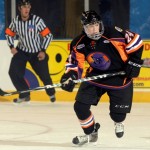Ty Loney, son of two-time Stanley Cup champion and longtime Penguins left-winger Troy Loney, may be following in his father’s footsteps, but he is far from a chip off the old block.
The 23-year old winger has signed a minor-league contract with the Pittsburgh Penguins top minor league affiliate – the Wilkes-Barre/Scranton Penguins – for the 2015-16 season.
As a 20-year old in 1983, Troy Loney made the same journey from amateur hockey to professional hockey in the Penguins organization. That’s about where the similarities end.
“The only thing that Ty and I share is that we are the same height and same weight at the same age,” Troy said. “He plays a completely different style. He’s definitely his own player.”

The differences began with their paths to the professional game. Troy started his junior hockey career with the Lethbridge Broncos of the Western Hockey League, part of the Canadian Hockey League, and he was drafted by the Penguins in the third round of the 1982 NHL Draft.
Ty, meanwhile, started his career in with the Youngstown Phantoms of the United States Hockey League before moving on to the University of Denver. Passed over in the draft, he has joined the Penguins organization as a free agent.
Their different paths to professional hockey were as much about circumstance as they were about preference.
“When I was making that decision in the late 70’s and early 80’s, college hockey was there, but it didn’t seem to be a very viable pathway to professional hockey,” Troy said. “There were very few players that had succeeded. You had the Miracle on Ice (in 1980), and they really broke the barriers down to that college perception.
So, my choices were pretty limited. I was 16 years old in Western Canada. I think I received one letter from the University of North Dakota when I was 15. The pathway was pretty clear if you wanted to play hockey at an elite level.

Now, fast forward to what my son, Ty, went through. He was a little bit of a late developer; he always was. The decision-making for Canadian junior hockey comes upon you a little bit quicker than in the states.
At the same time, the United States Hockey League started being the first stepping-stone to college hockey, which is tremendous hockey, and to the NHL. If you look around now, on NHL teams, 31% percent of the guys are coming out of college. That’s a lot of players.
If you look at the last few drafts and the players that come out of the USHL versus the Canadian hockey league, obviously, NHL teams love the NCAA model.
Ty wanted to play college hockey, and to be perfectly honest, we didn’t get a lot of wooing from the CHL, but I don’t think that would have made a difference.”

Several years after Ty had moved on from the Phantoms, and after Troy had spent some time away from the game, Troy and his wife Aafke took an ownership stake in the USHL team and he now serves as the team’s CEO.
“It combines my urge to stay in the business world with my desire to help hockey in the U.S.,” Troy said. “It dovetails well with what I want to do and with my wife’s secondary education business, so it seems to be a good fit.”
While Troy has been transitioning from a player to a front-office role, his son will be making an equally dramatic transition: from student-athlete at Denver to a professional hockey player in Wilkes-Barre.
“The leap to the pros is an adjustment,” Troy said. “I don’t think that’s changed dramatically over the years. There’s a different mindset as you move out of a little bit of an umbrella in the college world for four years, now moving on to a team where there’s lots of guys on the team that have the same goal and ambition: to make the Penguins team.
And now you’re friends, and at the same time battling for positions on the roster, when you’re in the minors and also when you’re on the big team. I don’t think that ever changes.”
When Troy turned 20 and graduated from the junior ranks, he was assigned to the Penguins AHL affiliate, which at the time was the Baltimore Skipjacks. At the end of last season, Ty got his first taste of AHL hockey as well.
“Ty, at the end of last season, he got a chance on what they call an amateur try-out with the Norfolk Admirals, which is in the Anaheim Ducks organization,” Troy said. “When he was down there going through it, he called me and said, ‘Dad, I feel like you were, however many years ago, going through the same things.’
That was kind of cool to hear him say that. It does kind of feel like that. It’s obviously much different as a parent than as a player. I’m proud of his accomplishments. I’m humbled and honored that the Penguins feel highly about Ty. It feels good. I keep reminding Ty to make sure he plays like plays, not like me. He’s his own player.”
Besides his physical characteristics, there is another trait that Ty has inherited from his father, and that is his determination to succeed in pro hockey
“There comes a point (in development) where everyone is kind of the same,” Troy said. “Everyone skates really well, everyone handles the puck about the same and everyone passes kind of the same. And then in my opinion, it comes down to two things: do you have the heart and do you have the brains to play the game at the next level?
When I watched Ty play in Norfolk, I try to keep the dad goggles off when I watch his games, I think he was in the top 25% of players on the ice. That made me feel good considering he had just stepped out of college hockey to play. He’s determined and we’re supportive.”
That determination will be combined with an opportunity for the younger Loney. The Penguins farm system isn’t full of highly drafted prospects at forward, and there is a specific lack of skilled forwards with the strength and desire to play in high-traffic areas. If Ty can combine his father’s size with his modern power forward style, there could soon be another Loney skating on the wing for the Penguins.
Photo credit: WBS Penguins (main), Pittsburgh Penguins and Youngstown Phantoms (insets)